How Can We Achieve Church Unity?
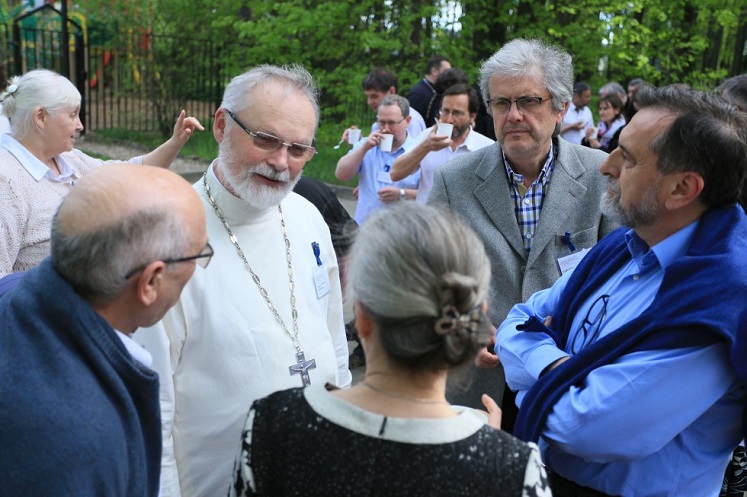
How is it possible to contemplate church unity in our day and age? What steps should be taken on the way to that unity? Is it true that theologians only get in the way of this task? And what role does the state play in the unification of separated churches? Participants in Church Unity in the 21st Century round table at St Philaret’s Institute (SFI) discuss these and other questions.
SFI was privileged to have Fr John Behr, Professor Petros Vassiliadis, Fr Georgy Kochetkov, Fr Stephan Lipke, S.J., and Pastor Martin Högger of the Evangelical Reformed Church of Switzerland all participating in this year’s annual theological research conference, which was held under the rubric Modern Orthodox Ecclesiology: The Theological Foundations of Church Unity.
What Church Are We Speaking About?
In (ThD) Fr John Behr’s opinion, when we speak about the Church or about churches, it is very important to ask ourselves exactly what we mean. “Are we speaking about different confessions? If we unite them, will that result in One Church? This is an enormous question,” Fr John believes. “When St Paul the apostle was founding the church, these were separate communities between which there wasn’t any unity to speak of. These communities were not even acquainted with each other, though from the very beginning there was a mandate to unite them. Thus the apostles began to write letters, to travel and to visit the various communities, to lay down material and other mutual assistance.”
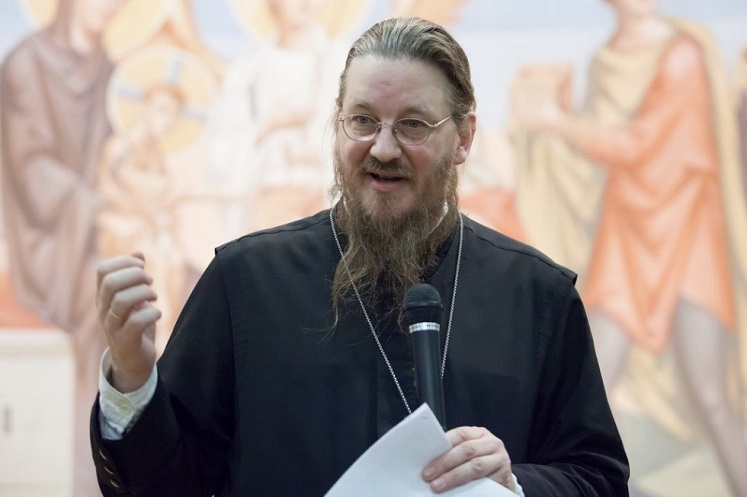
“Today we use the word ‘church’ to refer to national institutions which coordinate the communities across a given geographical location. Such coordination is necessary, but in the Niceo-Constantinopolitan Creed we speak of “one, holy, catholic and apostolic Church” – and it is unlikely that those who thought up that wording had in mind that which they achieved when they came together in one city for the council,” said Fr John.
The Founder of St Philaret’s Orthodox Christian Institute, PhD Candidate Fr Georgy Kochetkov, is also sure that it is important to clarify what Church we are speaking about when we speak of One Church. “The Church is one, but in history her boundaries have split in two, three, etc. For this reason, we differentiate between mystical, sacramental, canonical or legal boundaries,” says Fr Georgy. “These are different dimensions, although it is one and the same Church. And we need to exert specific effort to bring these into more accordance with each other.”
“There are some presumptions that we need to agree upon,” believes Fr Georgy Kochetkov. “In the first place, there are neither people nor – all the more – institutions, which know everything about God the Father, Christ, the Holy Spirit, or the Church, the world, or the human person. Even among the saints. The only possible exception may be our Lord, Jesus Christ, Himself. Secondly, no person is without fault. And if we are at fault not only personally, but even as a church gathering, this means that we are in need of repentance. This thought has been aired previously in our round tables, and I would only add one more thing: repentance is necessary both from the top downwards, and from the bottom upwards.”
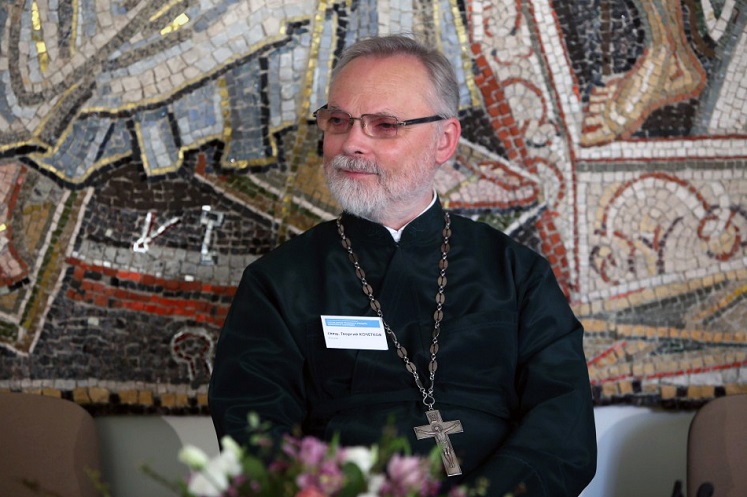
It’s More About Fear Than Theological Difference
For over 100 years, theologians from different confessions have been actively speaking with each other and fraternizing. Much had been discussed and a great amount of tension and disagreement has already been alleviated. It is harder and harder for us to find contradictions which would really separate us in terms of faith – which aren’t simply that sort of “heresy” or difference of opinion which St Paul considered necessary, “in order that those who are genuine among you may be recognized.” (1 Cor 11:19)
Fr Georgy Kochetkov is sure that they main hinderance to unity is a strong inclination to legalism and the Old Testament, and sometimes even to paganism, and also ties to political interests and structures which are too strong. “It’s possible to say that significant difference of opinion in terms of theological questions between Orthodox Christians and Roman Catholics no longer remain,” he says. “Yes, there are many cultural and historical particularities that remain to this day – but ever since the Vatican explained that legal unity is not a necessity and that it is not necessary to submit to the Pope, and that Eucharistic unity based in faith and life is sufficient, the Orthodox have breathed a sigh of relief.”
“At the same time, many fears remain,” says Fr Georgy. “These aren’t always well-founded, but they are widespread. The Orthodox can be frightened by the over-centralization of the Roman Catholics, and the spectre of the “cult of the Pope”, and the division of the church into teachers and learners. But the Russian church doesn’t suffer from clericalism any less than the Roman church. When speaking of Protestants, we might point to individualism or social activism that is to external in expression, or to micropapism – when the opinion of a single pastor becomes is taken as the last word in terms of “truth”. On the basis of this one might conclude that there is a lack of unity and even a lack of striving for unity. None of this has to do with theological issues, but it does hinder brotherly communion.”
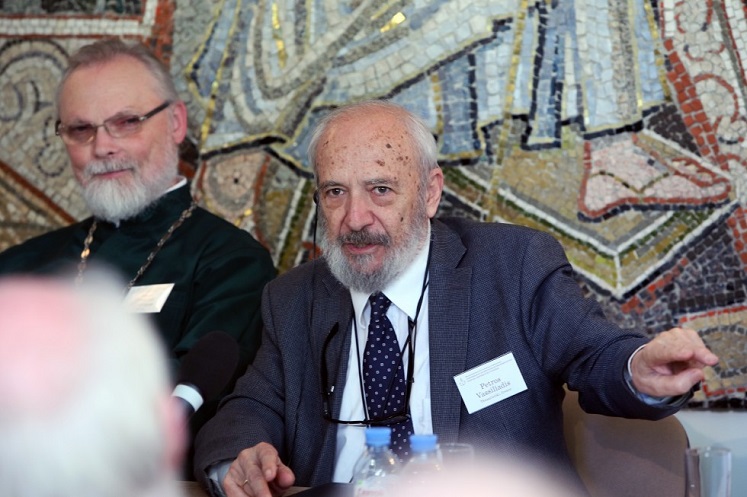
“As an Orthodox person who was raised in the ‘us isn’t them’ tradition of negative identity, when I started to fraternize with brothers and sisters who are Evangelical or Roman Catholic, I was amazed not only at the fact that we are so similar, but at the extent to which we think identically in terms of fundamental issues,” says Honorary Professor of Aristotle University, ThD Petros Vassiliadis. “Yes, for Orthodox Christians the unity of liturgical practice, prayer and life is extremely important. But at liturgy right before the Creed we hear, “let us love one another!” For me, this means that fellowship with brothers and sisters, including those from other confessions, is a priority and a condition for confessing our faith in its fullness.”
“Here is an example. For Catholics it’s Holy Week right now, and we Orthodox will celebrate Pascha a month from now and believe that this is right. But this contradicts the decisions and the spirit of the Nicene and other Ecumenical Councils, which underscored the importance of celebrating Pascha together. This unified celebration would be a very strong manifestation of the Christian unity that we have not achieved, despite the many efforts of the World Council of Churches (WCC) and our enlightened hierarchs, who tried to raise at least this question at the Pan-Orthodox Council,” says Petros Vassiliadis.
“I have to admit that it is only on the very rare occasion that I have seen my church ask for forgiveness,” says Professor Vassiliadis. “And every time the Pope asks for forgiveness publicly, I have been very envious. In these moments, I see that in my own tradition there is something significant missing. After all, metanoia – repentance – is the first step toward the acquisition of Church unity.”
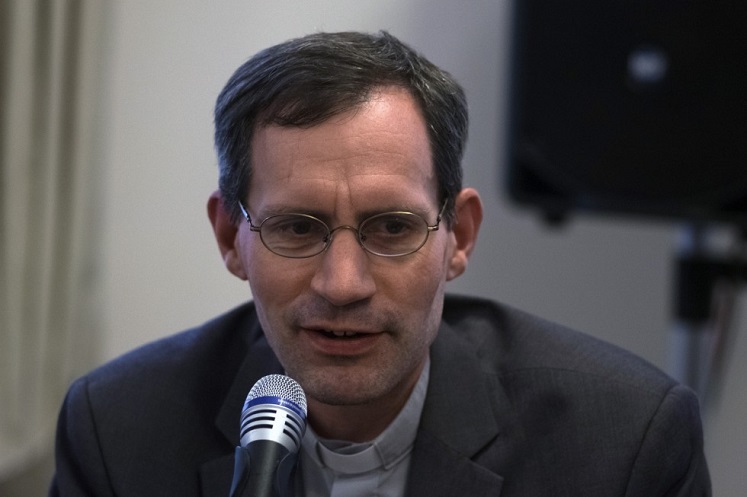
The Director of the Catholic Institute of St Thomas in Moscow, Fr Stephan Lipke, S.J., is also sure that the main hinderance to Christian unity is not related to theological contradiction. “Experience shows that since the time of the Cappadocian fathers, compromises have always been found when it comes to theological questions. But here is what people have almost never been able to agree upon – questions of power. There are many examples of this, right up until the 21st century. At the influence of the state is less dangerous in this regard than the church’s own striving for wealth, power, worldly glory and honour. This is the temptation which Christ avoided in the wilderness and which Dostoyevsky described as the problem of Catholicism. And it really is a problem of the Roman Catholic Church, but I think not only of the Roman Catholic Church… And for this reason, we need constant repentance, i.e. we need to test ourselves on the degree to which the “this worldly” inside us is prevailing.”
“I agree with Fr John Behr about the fact that we need to make sure we understand what we mean when we talk about the Church,” says Pastor Martin Högger of the Swiss Evangelical Reformed Church, who was Secretary General of Swiss Bible Society from 1989 to 1996. “Protestants also confess the Church as a mystery, into which we should immerse ourselves and in which we should live. There is a hierarchy of truths, and we are in agreement in terms of fundamentals. In essence, we are united by a single tradition of faith, faith in Christ and in the Holy Trinity. Here there are no differences of opinion. But I think you will excuse me if I give you a list of issues upon which we do need dialogue.”
Holy Mysteries in the Church and the Mystery of the Church
“The first issue is that of infant baptism, of which Baptists, Evangelical Christians and Pentecostals are very wary,” continues Pastor Högger. “As goes for the meaning of the Eucharist, when this question was discussed at the World Council of Churches, we were amazed to find how similarly we are! The ‘Baptism, Eucharist, Ministry’ (BEM) document has revealed that there is practically no disagreement between Roman Catholics, Lutherans and Reformed Christians over their understanding of the Eucharist. But the question as to who can lead the congregation remains. What is the connection between the ministry of the bishop, the presiding role at the Eucharist and the ministry to unity on the universal level? And there is still another question: most Protestants recognize the ministry of women. Is this an apostolic tradition or a Protestant innovation?”
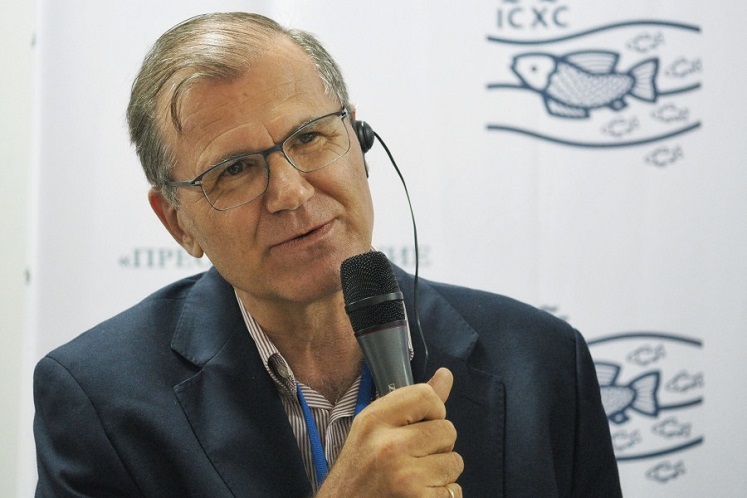
“In terms of the ministry and role of women, we are really trying,” says Professor Vassiliadis, the organizer of dozens of international theological discussions on women’s ministry in the church and the restoration of the order of diaconesses. “But we need time, so that we can restore, at least, that which is really the tradition our church.”
“We need to learn to live with the presence of various differences in approach and even teaching, and we need to be ready to accept others who have a different tradition and a different spirituality,” believes Petros Vassiliadis. “Fr Georgy Florovsky said that it is necessary that the East and the West should mutually complete each other – after all, truth is one. And, of course, we can remember Patriarch Athenagoras, who said that in order to achieve the unity of the Church, all the theologians should be sent away to some sort of island, and without them we will find unity much faster. Still I believe we should humbly exercise our responsibility as theologians. If we don’t, or if we are not humble in this, we easily fall into various forms of idolatry and religious confusion. It is so important to educate our churches if we want to achieve visible unity!”
“Fr Alexander Schmemann said that the Church itself is a Mystery and not an institute in possession of the mysteries,” Fr John Behr reminds us. “Baptism and the Eucharist give us a sacramental (and not institutional) foretaste or our physical death as a fulfilment of the Paschal mystery.” In Fr John’s opinion, during the 20th c. the Orthodox turned Eucharistic ecclesiology into episcopal ecclesiology. “We have turned everything upside down,” he says, “I am so tired of hearing St Ignatius of Antioch misquoted: “Where the Bishop is, there is the Church.” But he actually says, “The people should be in the same place as the bishop, in the place where Christ is, and there the Catholic Church is found.” We have thrown Christ out and now we have episcopal ecclesiology.”
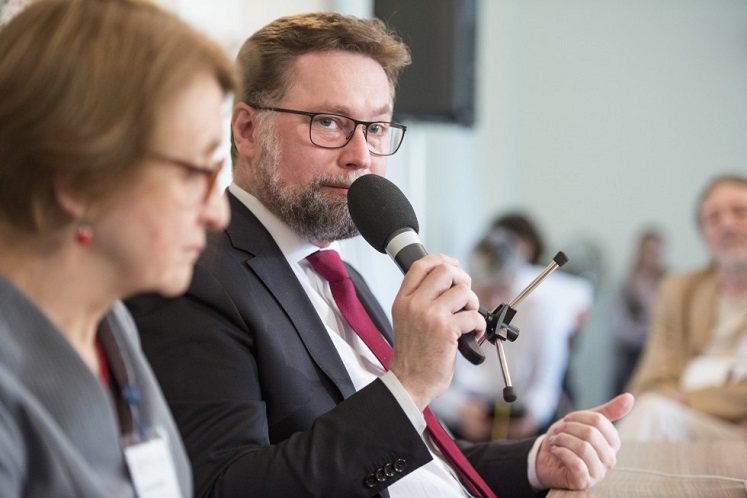
Shared Communion?
One of the most visible manifestations of the lack of unity among us, and something that every Christian runs up against, is the impossibility of receiving communion with brothers and sisters from different confessions. “This is the main thing that concerns people,” says Fr Stephan Lipke, S.J. “There may be many churches, but they can be connected by commonly offering each other Eucharistic hospitality. But this is my personal opinion, and the official position of the Roman Catholic Church is somewhat different. Where people share a common faith and common scriptures, here, in my opinion, there can be common communion. The main thing is to recognize each other and to recognize the Eucharist and then, maybe, the question of unity will sort itself out. Or perhaps it will never be sorted, and we will continue to search for unity on an administrative level, all the while knowing that in essentials we have already been granted unity.”
Fr John Behr is sure that in the case of the question regarding shared communion, just as with the issue of Church unity, we need to be very attentive to the meaning of words: “We are used to discussing conditions which, if met, might be the basis for communing from a single cup. But I would like to remind us of the fact that Christ says, “are you able to drink the cup that I drink?” (Mt 20:22) And that means to die with him for the world! And everything related to our identity shifts backstage, at that point, when we begin thinking about what it means to drink that cup, and what it means to commune in Christ, His Life, Death and Resurrection – these are not abstract dogmatic understandings. Or what? Do the words of St Ignatius of Antioch about the mystery of immortality mean, ‘if I belong to this religious group then I will have immortality’? Again, we have turned everything upside down!”
“Partaking of Christ, His Life, His Death and Resurrection really is the centre of the Eucharist,” agrees Pastor Martin Högger. “But this partaking reveals itself not only in Eucharist, and not just in the receiving of communion. Where two or three are gathered together in His name, there He is with them. He is present in His word, when we read and listen to this Word. And I know the power of this presence of Christ in my own personal experience. He is present when we serve, including when we serve the poor. I think that the main focus of Protestant ecclesiology is in this: the Church is where Christ is, including in the sacraments and mysteries – and not only among bishops!”
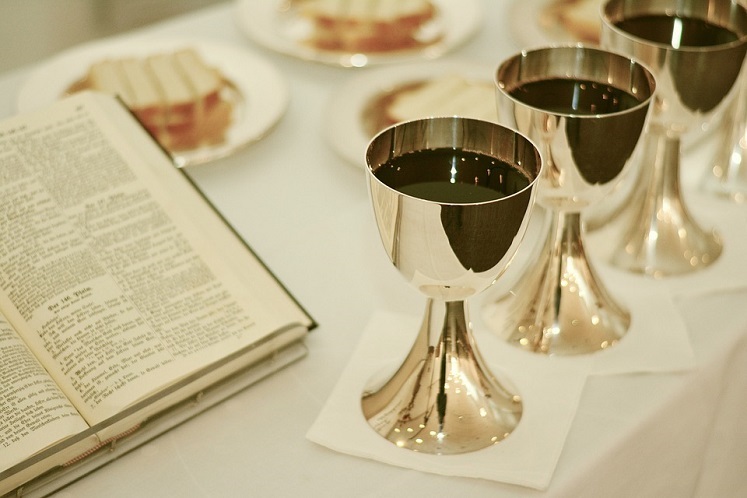
“As regards the questions of the Eucharist, various protestant Christians were long divided even among themselves: Lutherans couldn’t take communion with Reformed Christians, for instance,” said Martin Högger. “But, in 1956, Reformed Christians for the first time organized an ‘open altar’, and decided to commune all who believe in Christ as their Saviour. Since that time, the various Protestant churches have become more and more open to Eucharistic hospitality. Of course, we Protestants have a lot to acquire in terms of the beauty of the Eucharist, and need to deepen our Eucharistic spirituality. We need to put more emphasis on this; this also serves to foster Christian unity.”
“Prior to being able to share bread and wine at the altar, perhaps there are some intermediate forms,” for instance, agape meals, where brothers and sisters pass a cup with wine in which they dip bread as they declare, ‘Christ is among us!’, as the Transfiguration Brotherhood does. I really like this practice, and I’ve begun to suggest it at our ecumenical gatherings. It is a tremendous experience.”
“I’m not in agreement with Pastor Martin Högger when he says that “the Church is where Christ is” is Protestant ecclesiology,” says Fr Georgy Kochetkov. “This is ecclesiology that Protestants have taken from the Orthodox and something that they haven’t given us back, and we would also like to make use of it. It is our original ecclesiology, which we also call community-brotherhood ecclesiology. It is this ecclesiology which was the main understanding of the church until the middle of the 2nd century – before the appearance of Eucharistic ecclesiology. And the mysteries, here, are understood as our life in Christ as a whole, and not as liturgical and specifically sacramental mysteria. It is this understanding that we find in the New Testament: where Christ is, where the Holy Spirit is, where the Holy Trinity is – there is the Church!”
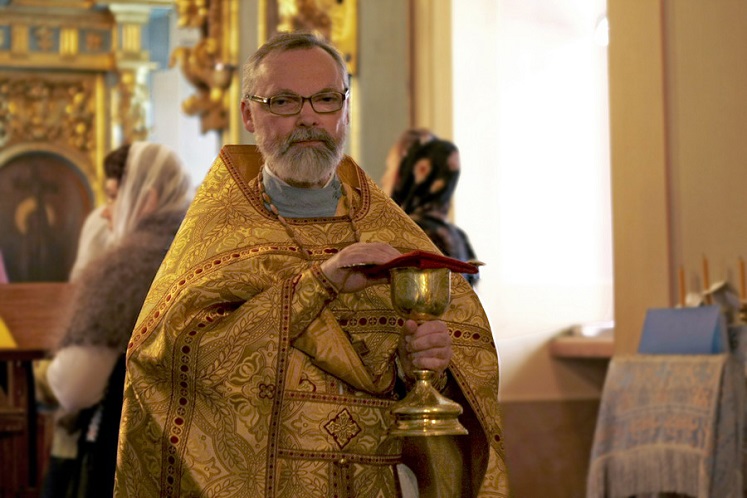
“If we wish to speak of receiving communion together,” says Fr Georgy, “in the 1990s, when I was head priest at the Vladimir Icon of the Mother of God Cathedral at the former Sretensky monastery in Moscow, we always had a steady stream of guests, and many of them were Roman Catholics. And my conscience would not allow me to refuse them communion with us. If these gusts were priests they came into the altar and communed with us. Lay people also received communion if they wished to. But just so as to be completely honest, I did ask them to answer two questions. The first question, which I would also ask any Orthodox person of whom I had no prior knowledge before communing them – was whether the person had committed any mortal sins. And for those who belonged to other churches, I also tried to work out the degree to which the person was sensitive to and in tune with catholicity – whether he considered Orthodox sacraments and the Orthodox Church to be grace-bearing. And if so, I didn’t see any impediments to common communion, insofar as I knew that we are of one faith – and everyone has some lapses. I understood that not everyone would be able to support this sort of practice, but at the same time I couldn’t force myself to do otherwise, as I would have been acting against my conscience. And for a priest, acting according to his conscience is very important – just as it is for any Christian.”
“No, it wasn’t serving at the same altar,” says Fr Georgy “And I don’t know what I would have done if someone had proposed to me that I serve the Eucharist together at a Protestant or Roman Catholic altar. It is true that I administered the sacrament of marriage standing at an altar in Milan – but this is a case of the question raised at our conference by Fr Stephan, of marriage between an Orthodox person and a Roman Catholic person.”
Prophets, Prophetesses, and Presiding Celebrants
“A contradiction that remains, despite a more or less common understanding of the Eucharist, is the question of who may preside at the Eucharist. In many ways this is related to the question about apostolic succession,” says Fr Georgy. “When many Orthodox speak of apostolic succession, for some reason they mean ordination-in-succession. But this is something entirely different than succession in terms of faith, hope, love, and spirit and meaning in the Christian life! Without these last things, apostolic succession in terms of ordination-in-succession means nothing: everybody knows that it is possible to canonically ordain some sort of black hog1 who will cause more ruin to the church than build it up. Succession in terms of ordination can only be a sign and a witness that there is succession in terms of deeper, more fundamental things – and sometimes we need to spot and identify these last things in a different way. All the more so as it is impossible to historically prove succession in terms of ordination. Anyone who deals with ancient history knows this to be a fact.”
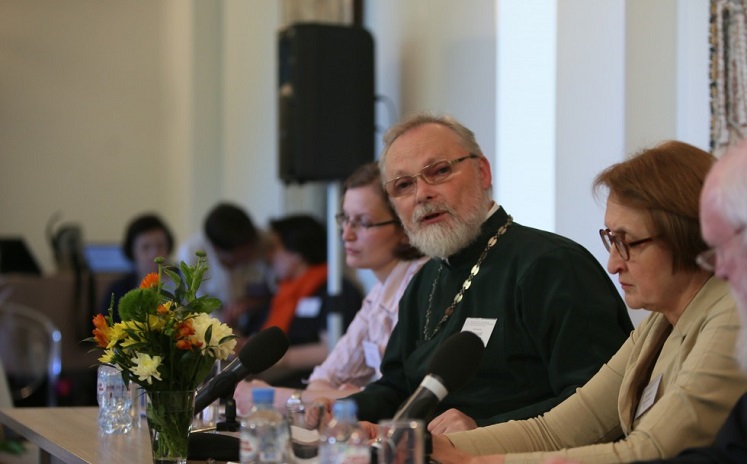
It’s worth remembering that in ancient times the Eucharistic gathering could be led by non-ordained prophets, as we see, for instance, in the Didache, a record from the beginning of the 2nd century. Yes, you may well ask – where are we going to get these prophets from? But we believe in the Church which is filled with the Holy Spirit, and the Holy Spirit, according to Justin Martyr, is the spirit of prophecy,” says Fr Georgy. “Perhaps the church has simply forgotten how to see and needs to look a little better? By the way, this raises an even scarier question: and what if amidst such prophets there happens to be, if you’ll excuse me, a woman?”
The question about who can commune and whom they can commune is addressed to our deepest ecclesial experience. “It is obvious that we don’t know this experience very well,” says Fr Georgy. “At the time of the Soviet GULAG the question of mutual communion was treated in a decisive manner – no one asked what your confession was. In the face of death and innocent suffering which makes people ‘family’, Orthodox, Roman Catholics and Protestants communed together, and this didn’t raise questions for anyone. This wasn’t a unique event, but a rule, which was forgotten instantaneously, when the position of the church in the context of our state again changed. The externals have changed, of course, but internally nothing has yet changed. We need to remember this experience if we really want to jump those hurdles which we have named here and which stand in the way of Christian unity.”
The Role of the State in Achievement of Church Unity
The state, of course, doesn’t have a vested interest in authentic Christian unity and understands the phenomenon of the unity of the Church in its own way, as a factor in bringing about social and political stability. “In Switzerland, the question of religion relates to governance not at the national level, but at the level of the separate cantons,” says Pastor Martin Högger, ex-President of the Council of Churches in the canton of Vaud. “For instance, in my canton (Vaud) the government sponsors ecumenical projects between Catholics and Protestants. They also wish for the Greek, Romanian, Serbian and Russian Orthodox Churches to be represented, but as one single group. Thus the Conference of Orthodox churches in this canton was created specifically to respond to that government’s demand. There are active ecumenical ministries in hospitals and prisons; this is good for the state and when the state supports such initiatives it is also supporting inter-church and inter-religious dialogue. In this process, of course, there can also be problems and tensions, because some of the government’s decisions also heighten various divisions.”
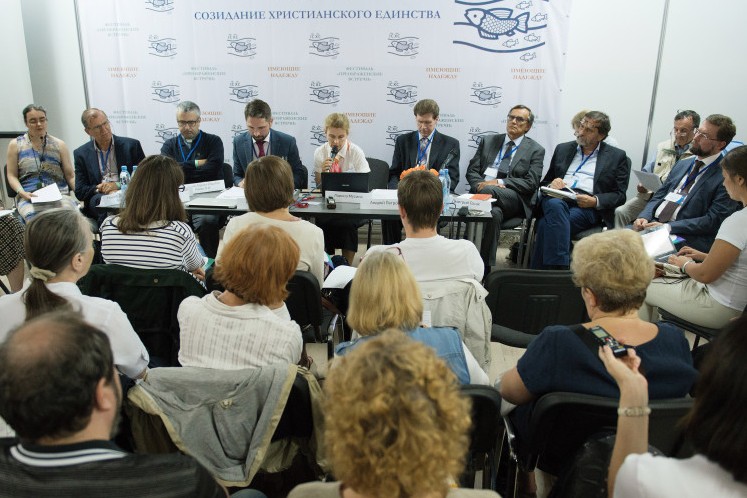
“In so-called Orthodox countries – which description is, of course, conditional – given that the Orthodox faith requires personal commitment and not only national identity – we can’t exclude people who occupy some sort of important position from among the number of God’s people,” says Professor Vassiliadis. “And if the powers that be aren’t cannibalistic but lean more toward democracy, then it isn’t possible to say that our Christian witness isn’t addressed, too, to these people in power. We need to give them a chance because sometimes they do what the church should be doing. John the Baptist said that ‘out of these stones God can raise up children for Abraham’ (Mt 3:9), and this is precisely such a case.”
“Remember Emperor Constantine, who endeavoured to unite the church – inside the empire and of course for the good of the empire – but nevertheless,” says Fr John Behr. “True, as soon as an empire begins to be called ‘Christian’ a number of problems arise. In the Epistle to Diognetos, we read that ‘for the Christian any foreign contrary is his home country, and any home country is a foreign country to him,’ because his true home country is in Heaven. And any attempt to manipulated that true home country in the interests of the state should be met with strong opposition. In ancient times, people gave their lives so as not to bow down to the state and its gods, but rather to Christ Jesus! And in terms of this sort of thing we are now entering into a very difficult time – even in Western Europe.”
In Fr Georgy’s opinion, time changed in a fundamental way in 1917, with the end of a 1500-year period of alliance between church and state that Fr Sergei Bulgakov called the Constantinian Era. “In Western Europe, this era began to draw to a close even earlier – perhaps from the time of the French Revolution, but it came to a close for all of us in 1917,” Fr Georgy is sure. “Although some people look at the modern relationship between the church and the state and say, ‘what do you mean it is over?’ Of course the state, in its own way, doesn’t want that era to come to an end, because in one way or another all governments would like the church to work for their benefit. And churches – especially the ancient churches – primarily the Orthodox, Roman Catholic and old Protestant churches, are extremely tied to the state.”
“Although we value everything that the Lord has revealed to us during the Constantinian period, overall we probably look upon that era negatively,” says Fr Georgy. “It was a big mistake to allow Emperor Constantine to preside at the 1st Ecumenical Council: it was a grave sin by which an unbaptised man in the clothes of a catechumen pronounced that the word ‘homoousios’ be used in the Creed. Constantine had other motivations which were not very ecclesial, even though he wanted to help the church in his own way. In one way or another the state binds the church and makes it responsible for aggression, without which not a single government in the world has ever managed to exist – and the church is then forced to take that terrible weight upon itself. There has been too much aggression in the history of the church, and at times the church has even contradicted freedom of conscience.”
In Fr Georgy’s opinion, today’s church has an interest in being independent of meddling on the part of the state, and should itself refrain from meddling in state affairs: “The church should behave itself in a dignified manner within society and culture, not lording over these spheres, which may be to a large degree non-ecclesial, and not dictating conditions within these spheres, but giving an ethical evaluation of societal and cultural life, but in no case prompting the arrest or imprisonment of people – as sometimes happens to this day. We shouldn’t be any more dependent upon the power of the state than the average citizen. Vis-à-vis the state, members of the church should have the same status as any other citizens. Rather we need more to be exercising our responsibilities to be conscious of our life inside the culture, society and the state – reacting to infringements on human rights and disconnectedness.”
“The church hasn’t begun to do this yet,” Fr Georgy believes. “She isn’t being allowed this, but she doesn’t really want this role, either. In order to be Herself, the Church needs to become an example of freedom. Yes, this will be uncomfortable, and the state might not like it very much, and perhaps not everyone will be up for martyrdom. But we can’t demand this of others – only of ourselves.”
Origin: https://sfi.ru/.
SFI’s 14th annual nationwide and international theological research conference – Contemporary Orthodox Ecclesiology: the Theological Foundations of Church Unity – was held in online format between 29 and 31 March, 2021.
The Conference pulled together academics from more than 20 institutes of higher learning and organizations across the entire world, including: the University of Aberdeen, the University of Athens, the State Social and Humanitarian University (Kolomna), Hellenic Open University, the Institute of St Thomas, the Institute of Ecumenical Theology of the University of Münster, Studiorum Novi Testamenti Societas (SNTS), International Hellenic University, Lomonosov Moscow State University, Saints Cyril and Methodius Institute for Postgraduate Studies, the Pontifical Oriental Institute, the Pontifical University of Saint Thomas Aquinas (Angelicum), the Pontifical Gregorian University, Herzen Russian State Pedagogical Institute, Vrije Universiteit Amsterdam, St Philaret’s Orthodox Christian Institute, the University of Graz, Aristotle University of Thessaloniki, Katholieke Universiteit Leuven, the University of Sibiu, St Petersburg Theological Academy, the Centre for Ecumenical, Missiological, and Environmental Studies (CEMES).
73 people from 14 countries and 7 churches took part in the conference: the Russian Orthodox Church, the Ukrainian Orthodox Church, the Romanian Orthodox Church, the Greek Orthodox Church, the Patriarchate of Constantinople, the Roman Catholic Church and the Evangelical Reformed Church.
Among the participants there were representatives of various associations and brotherhoods including: the Association of Friends of the Theology Faculty of Milan University, the Lord’s Army, the Little Brothers of Jesus (Brotherhood of Charles Foucauld), the Comunione e Liberazione, the Focolare Movement, the Transfiguration Fellowship of Minor Orthodox Brotherhoods, Christian Associations of Italian Workers (Associazioni Cristiane dei Lavoratori Italiani, ACLI).
The conference included 7 plenary sessions at which 27 papers were given, as well as a round table discussion on the Unity of the Church in the 21st Century. All of these sessions were and are available on the SFI YouTube Channel.